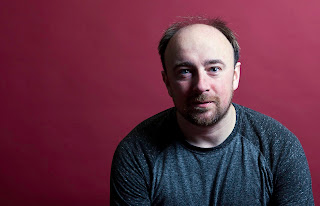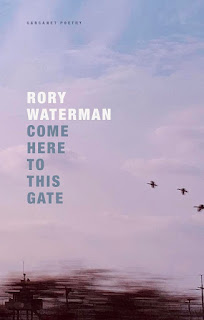Rory Waterman was born in Belfast in 1981, and grew up mainly in Lincolnshire. His fourth full-length collection, Come Here to This Gate, has just been published by Carcanet Press. His other collections, all published by Carcanet, are: Tonight the Summer’s Over (2013), which was a Poetry Book Society Recommendation and was shortlisted for a Seamus Heaney Award; Sarajevo Roses (2017), which was shortlisted for the Ledbury Forte Prize for Second Collections; and Sweet Nothings (2020). He is also regularly a critic for the TLS, PN Review and other publications, and has published several books on modern and contemporary poetry. He co-edits New Walk Editions with Nick Everett at the University of Leicester. He has a BA and PhD from the University of Leicester. Since 2012, he has worked at Nottingham Trent University, where he is Associate Professor of Modern and Contemporary Literature and leads the MA in Creative Writing. He lives in Nottingham. His website is here.
Come Here to This Gate, Rory Waterman's fourth collection, is his most candid and unexpected, personal, brash, hilarious, and wide-ranging. The book is in three parts, the first a sequence about the last year of the life of his father, the poet Andrew Waterman, against a backdrop of recrimination, love and alcoholic dementia: "your silences were trains departing." The second consists of poems that open various gates, or are forcibly restrained behind them, from the literal North and South Korean border to the borders between friends, and those imposed by photographs, memories, and paths taken and not taken. The third opens on the poet's rural home county of Lincolnshire. He rewrites several folk tales into galloping, sometimes rambunctious ballads for the 2020s: what happens when imps, ghosts, and a boggart who looks like a "doll left behind at Chernobyl" must reckon with the modern world and the people who lumber through it.
You can read more about Come Here to This Gate on the publisher's website here. You can read a review of the book on Everybody's Reviewing here. Below, you can read two poems from the collection.
From Come here to This Gate, by Rory Waterman
T-shirt weather today: a bumble bee bumps
the window, and the door of the visiting room
yawns and nudges a pot. We could go out,
sniff freedom over the fence. You’d rather not.
‘You’ve come to take me home?’ No, Dad. I’ve come
to bring it to you, blind on your piss-proof seat
on wheels, most of you a line of little knots
beneath a blanket. Stop-gap Clov to your Hamm –
someone to bring your sippy cup, some biscuits,
and you chew them in the back of your open mouth
in quiet, ‘thinking,’ too afraid to talk.
for impulse, or connection, which doesn’t come
until a nurse does, panting, to the door,
to tell us darlings we have five minutes more.
an old man had said, palming his chest. And
okay, I do. And there it stays, doing nothing
from a (re)claimed island, over (re)claimed islands
stacked with containers: a concreted sarcophagus,
which has no other memorial. A child beside me
pulls down her mask, is chastened, frumps.
a phosphoresced capital washing round its hills,
a land of neon chaebols and kimchi jars
of their lives for Samsung, Lotte, Hyundai,
as I complete this circuit for Hanjin.
here – there – with silt from China, as we skirt
North Korean airspace. This land is your land
of barnacles; dark fishing vessels ply
what looks turbid. And when we start to cross
is ordained, a city (Shenyang?) shifts,
a molten web in new night. Now there will be
and then the grind of lowering, the misted plots
of ruined nametagged earth around our lives.




